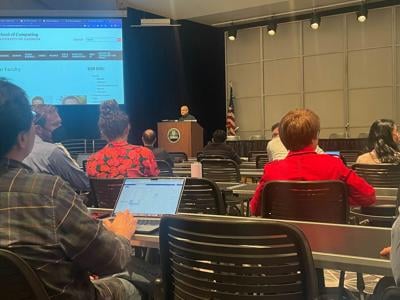Keynote speaker Irfan Essa, the senior associate dean of the College of Computing at Georgia Tech, explained recent developments of artificial intelligence and how these advancements may impact society at the University of Georgia School of Computing’s Research Day on Nov. 17.
“Ask not when, or if, AI will replace people,” Essa said. “Ask when people using AI will replace people not using AI.”
There was also computer science trivia and a panel discussion, in addition to the keynote address. Anna Stenport, Dean of the Franklin College of Arts and Sciences, opened with a speech emphasizing the importance of the new School of Computing and all the new possibilities that come with the establishment of this interdisciplinary school.
In July of 2022, UGA’s department of computer science was promoted to the School of Computing, and is jointly administered by the College of Engineering and the Franklin College of Arts and Sciences.
“This is a jointly appointed school with broad horizons and a bright future,” Stenport said. “I have come to know, over just the past number of months that I've been on campus, the ways in which we embrace the distinctiveness of this School of Computing, because we embrace the old, the new and the ambitious.”
However, Stenport also said that new opportunities come with a responsibility to ethically consider how the power of computing is applied. Shelley Hooks, the Associate Vice-President of Research at UGA, seconded that, saying UGA was a particularly exciting place for computing and artificial intelligence fields.
Essa’s speech, titled Generative AI and Responsive AI, began with an explanation of what artificial intelligence is and the research and information that goes into its development. He said the interdisciplinary system requires an understanding of humans, as well as the map keys and ethics on how to deploy said systems.
Essa went on to discuss the controversial topics surrounding the development of artificial intelligence, which include subjects ranging from Chat GPT and doctored videos to self-driving cars and robots.
“You have to remember that there's a lot of misinformation and disinformation that doesn't use any of this technology,” Essa said. “People take a picture from 10 years ago and post it saying this happened today and it creates riots. There is no minute image manipulation.”
Throughout his keynote speech, Essa went into technical detail about the inner-workings and ongoing research involving artificial and augmented intelligence. The full speeches can be viewed here.
Following the keynote speech, attendees played computer science trivia. After prizes were awarded for the trivia winners, a panel of computer science and artificial intelligence professors convened to discuss the impacts that AI development has had on education.
“Different people learn in different ways,” Essa said. “So we can not fully adapt to every possible learner, but an AI system can.”
Following the panel discussion, undergraduate and graduate students presented posters that they created to inform about artificial intelligence, and then professors and students shared a light dinner and discussed computer science in further detail.


